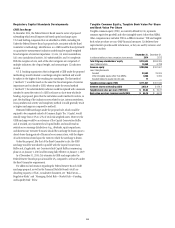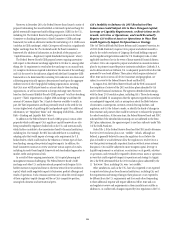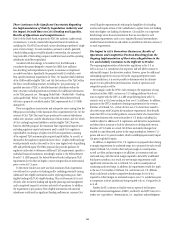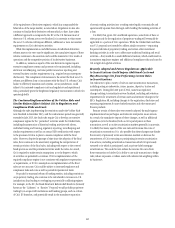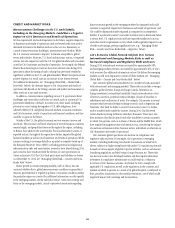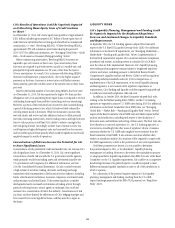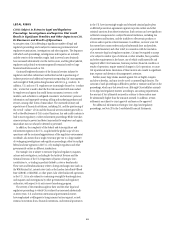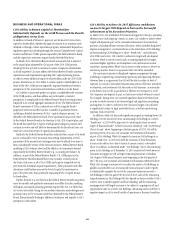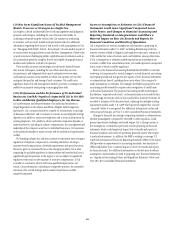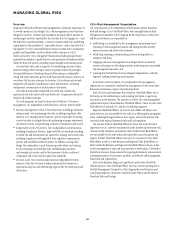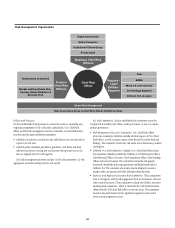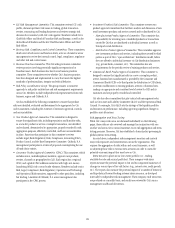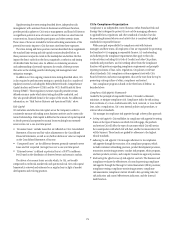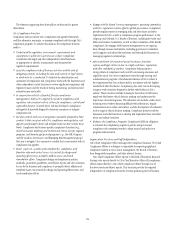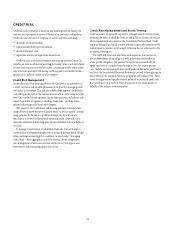Citibank 2014 Annual Report Download - page 80
Download and view the complete annual report
Please find page 80 of the 2014 Citibank annual report below. You can navigate through the pages in the report by either clicking on the pages listed below, or by using the keyword search tool below to find specific information within the annual report.63
Citi’s Ability to Utilize Its DTAs, and Thus Reduce
the Negative Impact of the DTAs on Citi’s Regulatory
Capital, Will Be Driven by Its Ability to Generate U.S.
Taxable Income.
At December 31, 2014, Citi’s net DTAs were $49.5 billion, of which
approximately $34.3 billion was excluded from Citi’s Common Equity Tier 1
Capital, on a fully implemented basis, under the final U.S. Basel III rules (for
additional information, see “Capital Resources—Components of Capital
under Basel III (Advanced Approaches with Full Implementation)” above).
In addition, of the net DTAs as of year-end 2014, approximately $17.6 billion
related to foreign tax credit carry-forwards (FTCs). The carry-forward
utilization period for FTCs is 10 years and represents the most time-sensitive
component of Citi’s DTAs. Of the FTCs at year-end 2014, approximately
$1.9 billion expire in 2017, $5.2 billion expire in 2018 and the remaining
$10.5 billion expire over the period of 2019–2023. Citi must utilize any FTCs
generated in the then-current year prior to utilizing any carry-forward FTCs.
The accounting treatment for realization of DTAs, including FTCs, is
complex and requires significant judgment and estimates regarding future
taxable earnings in the jurisdictions in which the DTAs arise and available
tax planning strategies. Citi’s ability to utilize its DTAs, including the
FTC components, and thus use the capital supporting the DTAs for more
productive purposes, will be dependent upon Citi’s ability to generate U.S.
taxable income in the relevant tax carry-forward periods. Failure to realize
any portion of the DTAs would also have a corresponding negative impact on
Citi’s net income.
In addition, with regard to FTCs, utilization will be influenced by
actions to optimize U.S. taxable earnings for the purpose of consuming the
FTC carry-forward component of the DTAs prior to expiration. These FTC
actions, however, may serve to increase the DTAs for other less time sensitive
components. Moreover, tax return limitations on FTCs and general business
credits that cause Citi to incur current tax expense, notwithstanding its tax
carry-forward position, could impact the rate of overall DTA utilization.
DTA utilization will also continue to be driven by movements in Citi’s
Accumulated other comprehensive income, which can be impacted by
changes in interest rates and foreign exchange rates.
For additional information on Citi’s DTAs, including the FTCs, see
“Significant Accounting Policies and Significant Estimates—Income Taxes”
below and Note 9 to the Consolidated Financial Statements.
The Value of Citi’s DTAs Could Be Significantly Reduced If
Corporate Tax Rates in the U.S. or Certain State or Foreign
Jurisdictions Decline or as a Result of Other Changes in the
U.S. Corporate Tax System.
Congress and the Obama Administration have discussed decreasing the U.S.
corporate tax rate. Similar discussions have taken place in certain local,
state and foreign jurisdictions, including in New York City and Japan. While
Citi may benefit in some respects from any decrease in corporate tax rates,
a reduction in the U.S., state or foreign corporate tax rates could result in a
decrease, perhaps significant, in the value of Citi’s DTAs, which would result
in a reduction to Citi’s net income during the period in which the change is
enacted. There have also been recent discussions of more sweeping changes
to the U.S. tax system. It is uncertain whether or when any such tax reform
proposals will be enacted into law, and whether or how they will affect
Citi’s DTAs.
Citi’s Interpretation or Application of the Extensive Tax
Laws to Which It Is Subject Could Differ from Those of the
Relevant Governmental Authorities, Which Could Result in
the Payment of Additional Taxes and Penalties.
Citi is subject to the various tax laws of the U.S. and its states and
municipalities, as well as the numerous foreign jurisdictions in which
it operates. These tax laws are inherently complex and Citi must make
judgments and interpretations about the application of these laws to its
entities, operations and businesses. Citi’s interpretations and application
of the tax laws, including with respect to withholding tax obligations and
stamp and other transactional taxes, could differ from that of the relevant
governmental taxing authority, which could result in the potential for the
payment of additional taxes, penalties or interest, which could be material.
Citi’s Operational Systems and Networks Have Been, and
Will Continue to Be, Subject to an Increasing Risk of
Continually Evolving Cybersecurity or Other Technological
Risks Which Could Result in the Disclosure of Confidential
Client or Customer Information, Damage to Citi’s
Reputation, Additional Costs to Citi, Regulatory Penalties
and Financial Losses.
A significant portion of Citi’s operations relies heavily on the secure
processing, storage and transmission of confidential and other information
as well as the monitoring of a large number of complex transactions on
a minute-by-minute basis. For example, through its Global Consumer
Banking, credit card and securities services businesses, Citi obtains and
stores an extensive amount of personal and client-specific information
for its retail, corporate and governmental customers and clients and must
accurately record and reflect their extensive account transactions. With the
evolving proliferation of new technologies and the increasing use of the
Internet and mobile devices to conduct financial transactions, large, global
financial institutions such as Citi have been, and will continue to be, subject
to an increasing risk of cyber incidents from these activities.


